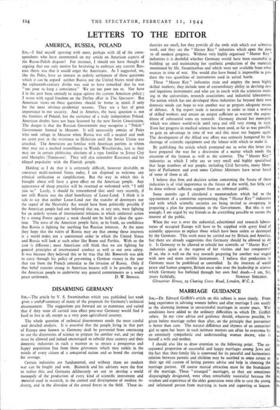DISARMING GERMANY
Sitt,—The article by V. S. Swaminathan which you published last week gives a usefur summary of many of the proposals for Germany's technical disarmament. The suggestions put forward are so numerous and varied that if they were all carried into effect post-war Germany would find it hard to live at all, except as a very poor agricultural country.
The whole question of technical disarmament needs the most careful and detailed analysis. It is essential that the people. living in that part of Europe now known as Germany shall be prevented from continuing to use the discoveries of science to prepare for another war, and yet they must be allowed and indeed encouraged to rebuild their country and their domestic industries in such a manner as to ensure a prosperous and happy population free from those grievances which may rankle in the minds of every citizen of a conquered nation and so breed the craving for revenge.
Certain industries are fundamental, and without them no modern war can be fought and won. Bismarck and his advisers were the first to realise this, and Germany deliberately set out to develop a world monopoly of the production of every kind of scientific instrument and material used in research, in the control and development of modern in- dustry, and in the direction of the armed forces in the field. These in- dustries are small, but they provide all the tools with which our scientists work, and they are the "Master Key" industries which open the door to all modern progress. Without very highly organised "Master Key" industries it is doubtful whether Germany would have been successful in building up and maintaining her synthetic production of the materials mentioned by Mr. Swaminathan and which were not available from other sources in time of war. She would also have found it impossible to pro- duce the vast quantities of instruments used in actual battle.
These "Master Key" industries train and employ the most highly skilled workers; they include men of extraordinary ability in devising new and ingenious instruments and who are in touch with the scientists work- ing in the universities, research associations and industrial laboratories. No nation which has not developed these industries far beyond their own domestic needs can hope to win another war or prepare adequate means of defence. A big export trade is necessary in order to train a reserve of skilled workers and ensure an output sufficient to warrant the expen- diture of substantial sums on research. Germany abused her monopoly which was 'almost world-wide until 1914 and still very strong in 1939. Even her progress in medical science has been used, as far as was possible, to gain an advantage in time of war and this must not happen again. The development of the Allied war effort was seriously hampered by the shortage of scientific equipment and the labour with which to make it.
By publishing the article which prompted me to write this letter you have prepared the way for a discussion of a matter which needs the attention of the layman as well as the scientist. The "Master Key" industries to which I refer are so very small and highly specialised that large numbers of our people, including Civil Servants, many Mem- bers of Parliament and even some Cabinet Ministers have never heard of some of them at all.
I believe that firm and decisive action concerning the future of these industries is of vital importance to the future of the world, but little can be done without sufficient support from an informed public.
Some months ago I circulated a memorandum which led to the appointment of a committee representing these "Master Key" industries and with which scientific societies are being invited to co-operate in preparing a plan for presentation to the Government. But this is not enough; I am urged by my friends to do everything possible to secure the interest of the public.
When the war is over the industrial, educational and research labora- tories of occupied Europe will have to be supplied with very kind of scientific apparatus to replace those which have been stolen or destroyed by the Germans. This work must be carried out by Britain and America, but there are already suggestions that Germany should be allowed to do it. Is Germany to be allowed to rebuild her scientific or "Master Key" industries again at the expense of her victims and her conquerors? If so, she is well on the way towards preparing for another war waged with new and more terrible instruments. I believe that production in Germany must be prohibited or controlled. In the interests of world peace and human progress, Britain must take over the leadership in science which Germany has forfeited through her own foul deeds.—! am, Sir,


























 Previous page
Previous page